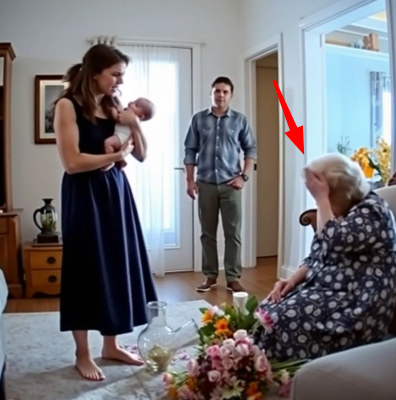
The three words I said were simple, yet they held the weight of an entire world within them: “It’s over. Leave.”
For a moment, my son and his wife stood frozen, as if time had stopped and they couldn’t quite process what they had heard. Everly’s eyes widened in disbelief, while Samuel’s face morphed from confusion to a pale resignation.
“Dad, wait, what do you mean?” Samuel stammered, his voice tinged with a hint of desperation. “You can’t just kick us out.”
But I could, and I would. This was no longer a home for love and laughter, where family gathered and shared their lives. It had become something else entirely, a place where my wife and I were made to feel like strangers, trespassers in our own sanctuary.
“I mean exactly what I said,” I replied, my voice steady with a resolve I hadn’t known I possessed. “You’ve disrespected your mother, and I won’t have it. This is our home, and if you can’t treat us with the respect we deserve, then you need to find somewhere else to live.”
Everly opened her mouth to argue, but I raised a hand to stop her. “No more words, Everly. I understand you’re protective of your child, but this was too far. You owe her an apology, but more importantly, you owe her respect.”
The silence between us was thick, punctuated only by the distant tolling of the grandfather clock in the hallway. Samuel, who had always been more of a peacekeeper than a fighter, finally spoke up. “Dad, we need a bit of time, please. We have a newborn and nowhere else to go.”
I had anticipated this plea, but my decision remained the same. “You have two days to make arrangements. I’ll assist you in finding a place, if necessary, but you cannot stay here any longer.” My voice softened slightly as I added, “This isn’t just about yesterday, Samuel. It’s about everything leading up to it. Your mother deserves peace in her home.”
Samuel nodded, a reluctant acceptance seeping into his posture. He understood, perhaps better than Everly, the quiet strength and dignity his mother possessed, and how undeserving she was of the insult thrown at her.
As they retreated to their room, I turned to find Martha standing in the doorway. There was a mix of relief and sorrow in her eyes, but mostly, there was love. She walked over to me, her steps sure and steady.
“You did the right thing,” she whispered, resting her head against my chest. I wrapped my arms around her, holding her close.
For the first time in a long while, our home felt lighter, as if the walls themselves sighed with relief. While I knew this decision would bring challenges, especially for Samuel and Everly, it was necessary for Martha and me to reclaim the space that was rightfully ours.
Over the course of the next two days, we helped them find a small apartment nearby. They moved out quietly, with little drama, and though the parting was bittersweet, it was amicable.
In the following weeks, a new normal began to take shape. We visited Samuel and Everly regularly, ensuring our grandson was surrounded by love. Boundaries were established and respected, and slowly, respect began to mend what had been fractured.
Our home, once again, became a sanctuary, filled with the laughter and warmth that Martha and I had nurtured for decades. And through it all, the knowledge that we had stood up for what was right continued to strengthen the bond between us.



